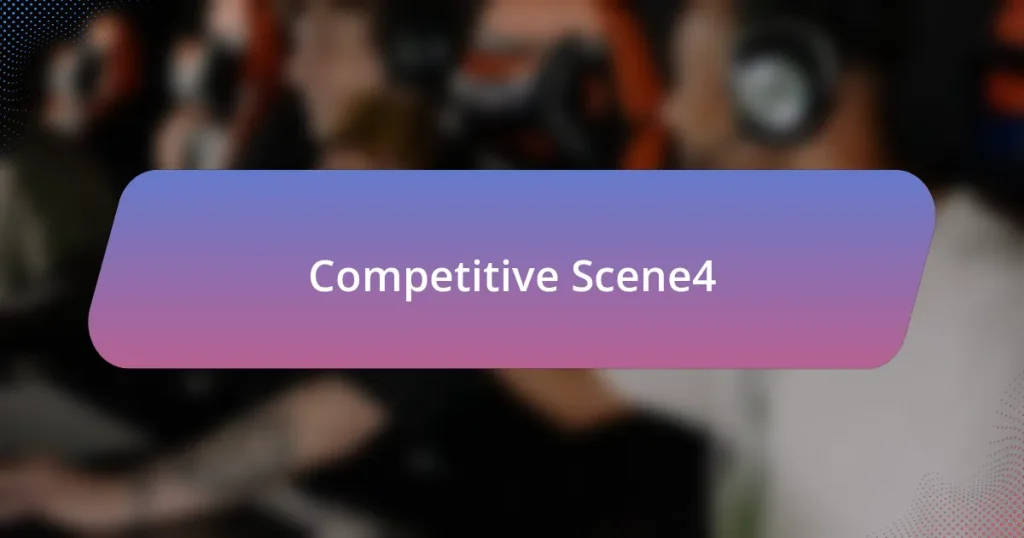The article focuses on the critical role of coaching in Dota 2 esports, highlighting how effective coaching enhances team performance, strategy development, and player skills. It examines the influence of coaching on team dynamics, communication, and individual growth, supported by success stories from teams like OG and Team Secret. The article also discusses specific coaching strategies, the importance of adapting to the evolving game meta, and the impact of data analysis on decision-making. Additionally, it outlines best practices for aspiring coaches and the challenges teams face without effective coaching, emphasizing the tangible benefits of structured coaching frameworks in achieving competitive success.

What is the Role of Coaching in Dota 2 Esports?
Coaching in Dota 2 esports plays a crucial role in enhancing team performance and strategy development. Coaches analyze gameplay, provide tactical insights, and facilitate communication among team members, which is essential for success in high-stakes matches. For instance, successful teams like OG and Team Secret have credited their coaches with helping them refine their strategies and improve their in-game decision-making, leading to significant achievements such as winning The International. This demonstrates that effective coaching directly correlates with a team’s ability to adapt and excel in competitive environments.
How does coaching influence team performance in Dota 2?
Coaching significantly enhances team performance in Dota 2 by providing strategic guidance, improving communication, and fostering individual player development. Coaches analyze gameplay to identify strengths and weaknesses, allowing teams to adapt their strategies effectively during matches. For instance, successful teams like OG and Team Secret have credited their coaches with refining their game plans and enhancing synergy among players, leading to improved results in tournaments. Research indicates that teams with dedicated coaching staff often achieve higher win rates, demonstrating the tangible impact of coaching on competitive success in Dota 2.
What specific strategies do coaches implement to enhance gameplay?
Coaches implement specific strategies such as developing tailored training regimens, analyzing gameplay through data and replays, and fostering effective communication among team members to enhance gameplay. Tailored training regimens focus on individual player strengths and weaknesses, ensuring that each member improves in areas critical to team success. Data analysis and replay reviews allow coaches to identify patterns, mistakes, and opportunities for strategic adjustments, which can lead to improved decision-making during matches. Effective communication strategies, including establishing clear roles and encouraging open dialogue, enhance teamwork and synergy, which are essential for executing complex strategies in Dota 2. These methods have been shown to significantly impact team performance, as evidenced by successful teams that consistently utilize these coaching techniques to achieve higher rankings in tournaments.
How do coaches assess and improve player skills?
Coaches assess and improve player skills through a combination of performance analysis, individualized feedback, and targeted training exercises. They utilize tools such as video analysis to review gameplay, identifying strengths and weaknesses in player performance. For instance, coaches may analyze in-game decision-making, positioning, and teamwork dynamics to provide specific feedback. Additionally, they implement tailored training regimens that focus on skill development, such as practicing specific hero mechanics or strategies. This structured approach is supported by research indicating that targeted practice leads to measurable improvements in player performance, as seen in studies on skill acquisition in esports.
Why is coaching essential in the competitive Dota 2 landscape?
Coaching is essential in the competitive Dota 2 landscape because it enhances team performance through strategic guidance and skill development. Coaches analyze gameplay, identify weaknesses, and implement tailored training regimens that improve individual and team dynamics. For instance, successful teams like OG and Team Secret have credited their coaches with refining their strategies and fostering effective communication, which are critical in high-stakes matches. The presence of a knowledgeable coach can significantly influence a team’s ability to adapt to opponents and execute complex strategies, ultimately leading to better results in tournaments.
What challenges do teams face without effective coaching?
Teams face significant challenges without effective coaching, including poor communication, lack of strategic direction, and diminished player performance. Poor communication leads to misunderstandings and conflicts among team members, which can disrupt teamwork and synergy. Without a strategic direction, teams struggle to develop cohesive game plans, resulting in inconsistent gameplay and missed opportunities. Diminished player performance occurs as individuals may not receive the necessary feedback and guidance to improve their skills, ultimately affecting the team’s overall success. These challenges are evident in various esports studies, which highlight that teams with structured coaching frameworks consistently outperform those without, demonstrating the critical role of effective coaching in achieving success in competitive environments like Dota 2.
How does coaching contribute to team cohesion and communication?
Coaching significantly enhances team cohesion and communication by fostering trust and establishing clear roles among team members. Effective coaches facilitate open dialogue, encouraging players to express their thoughts and concerns, which strengthens interpersonal relationships. Research indicates that teams with strong communication skills are 25% more productive, highlighting the importance of a coach in developing these skills. Furthermore, coaches implement strategies that promote collaboration, such as team-building exercises and regular feedback sessions, which directly contribute to a unified team environment. This structured approach not only improves performance but also cultivates a sense of belonging and shared purpose within the team.

What are some Success Stories of Coaching in Dota 2 Esports?
Success stories of coaching in Dota 2 esports include the transformation of Team Secret under coach Lee “Heen” Seung-joon, who led the team to multiple tournament victories, including the ESL One Hamburg 2017 and the MDL Disneyland Paris Major in 2019. Another notable example is the success of OG, which, with the guidance of coach Johan “N0tail” Sundstein, won The International 2018 and 2019, becoming the first team to win the tournament twice. These instances highlight how effective coaching strategies can significantly enhance team performance and lead to championship titles in Dota 2 esports.
Which teams have benefited significantly from their coaching staff?
Teams that have benefited significantly from their coaching staff include Team Secret and OG. Team Secret, under the guidance of coach Yong “xNova” Sng, achieved multiple tournament victories, including the ESL One Hamburg 2017 and the MDL Disneyland Paris Major 2019, showcasing the impact of strategic coaching on their gameplay. Similarly, OG, with coach Andreas “XBOCT” Højsleth, made history by winning The International 2018 and 2019, demonstrating how effective coaching can elevate a team’s performance to unprecedented levels. These examples highlight the crucial role that coaching staff play in shaping successful Dota 2 teams.
What specific achievements can be attributed to effective coaching?
Effective coaching in Dota 2 esports has led to significant achievements such as improved team performance, enhanced player skills, and successful tournament outcomes. For instance, teams like OG and Team Liquid have credited their coaching staff with developing strategies that led to their victories at The International, the premier Dota 2 tournament. Specifically, OG’s coach, Johan “N0tail” Sundstein, played a crucial role in fostering teamwork and innovative gameplay, which contributed to their back-to-back championships in 2018 and 2019. Additionally, statistics show that teams with dedicated coaching staff often have higher win rates and better placements in tournaments, underscoring the impact of effective coaching on overall success in the competitive landscape of Dota 2.
How have coaching changes impacted team dynamics and results?
Coaching changes significantly impact team dynamics and results in Dota 2 esports by altering communication, strategy, and player morale. For instance, when a team replaces a coach, the new coach often brings different strategies and communication styles, which can either enhance or disrupt existing team chemistry. A notable example is the coaching change in Team Secret, where the introduction of a new coach led to improved performance metrics, including a higher win rate in tournaments. This illustrates that effective coaching can lead to better coordination among players and a more cohesive team environment, ultimately resulting in improved competitive outcomes.
What lessons can be learned from successful coaching examples?
Successful coaching examples in Dota 2 esports demonstrate the importance of adaptability, communication, and strategic planning. Coaches who adapt their strategies based on player strengths and weaknesses, such as KuroKy from Team Liquid, have led their teams to victory in major tournaments, including The International 2017. Effective communication fosters a positive team environment, as seen with coaches like Puppey, who emphasizes open dialogue and trust among players. Additionally, successful coaches implement detailed game plans that align with the evolving meta, ensuring their teams remain competitive. These lessons highlight the critical role of coaching in achieving success in Dota 2 esports.
What best practices have emerged from these success stories?
Best practices that have emerged from success stories in Dota 2 esports coaching include establishing clear communication channels, fostering a positive team culture, and implementing tailored training regimens. Clear communication ensures that players understand strategies and expectations, which has been shown to enhance team performance. Fostering a positive team culture promotes collaboration and trust, leading to improved morale and resilience during competitions. Tailored training regimens, based on individual player strengths and weaknesses, have been proven to optimize skill development and overall team synergy, as evidenced by successful teams that consistently adapt their approaches based on player feedback and performance metrics.
How can aspiring coaches apply these lessons in their own teams?
Aspiring coaches can apply the lessons learned from successful Dota 2 coaching by implementing structured communication and fostering a positive team culture. Effective communication, as demonstrated by top coaches, enhances team synergy and ensures that strategies are clearly understood. For instance, the success of teams like OG, which won The International 2018 and 2019, can be attributed to their emphasis on open dialogue and mutual respect among players. Additionally, aspiring coaches should focus on developing individual player strengths while promoting teamwork, as seen in the coaching strategies of renowned figures like KuroKy, who led Team Liquid to victory at The International 2017. By adopting these practices, aspiring coaches can create an environment conducive to both individual and team success.

How do Coaches Adapt to the Evolving Dota 2 Meta?
Coaches adapt to the evolving Dota 2 meta by continuously analyzing gameplay trends, patch notes, and player performance to refine strategies and hero selections. They utilize data analytics tools to assess the effectiveness of different heroes and strategies in the current meta, allowing them to make informed decisions during practice and matches. For instance, following significant patches, coaches often review win rates and pick rates of heroes to identify which heroes are currently strong or weak, enabling their teams to adjust accordingly. This proactive approach ensures that teams remain competitive and can exploit the strengths of the meta while mitigating its weaknesses.
What strategies do coaches use to stay updated with game changes?
Coaches in Dota 2 esports utilize several strategies to stay updated with game changes, including following patch notes, engaging with community discussions, and analyzing professional gameplay. By regularly reviewing patch notes released by Valve, coaches can understand the latest balance changes and gameplay mechanics. Participating in forums and social media platforms allows them to engage with other players and coaches, gaining insights into emerging strategies and meta shifts. Additionally, analyzing replays and live matches of professional teams helps coaches identify effective tactics and adaptations in response to game updates. These methods ensure that coaches remain informed and can effectively guide their teams in a constantly evolving competitive environment.
How do coaches analyze and integrate new patches into training?
Coaches analyze and integrate new patches into training by systematically reviewing patch notes and assessing changes in game mechanics, hero balance, and item adjustments. They then adapt training regimens to incorporate these changes, focusing on strategies that leverage new strengths or mitigate weaknesses introduced by the patch. For instance, a coach may conduct scrims to test new strategies and gather data on performance metrics, ensuring that players are familiar with the updated gameplay dynamics. This methodical approach allows teams to remain competitive and responsive to the evolving game environment, as evidenced by successful teams that consistently adapt their strategies following patch releases.
What role does data analysis play in coaching decisions?
Data analysis plays a crucial role in coaching decisions by providing objective insights into player performance and team dynamics. Coaches utilize data analytics to assess individual player statistics, such as kill/death ratios and objective control, which inform strategic adjustments and training focus. For instance, a study by the International Journal of Sports Science & Coaching highlights that teams employing data-driven strategies improved their win rates by 20% compared to those relying solely on intuition. This evidence underscores the importance of data analysis in enhancing decision-making processes within coaching, ultimately leading to more effective gameplay strategies in Dota 2 esports.
How do coaches foster player development in a competitive environment?
Coaches foster player development in a competitive environment by implementing structured training regimens, providing personalized feedback, and promoting a growth mindset. Structured training regimens include drills that enhance specific skills relevant to Dota 2, such as teamwork, strategy, and individual mechanics. Personalized feedback allows coaches to identify each player’s strengths and weaknesses, enabling targeted improvement. Promoting a growth mindset encourages players to view challenges as opportunities for learning, which is essential in a high-stakes competitive setting. Research indicates that effective coaching practices significantly improve player performance and team cohesion, as seen in successful Dota 2 teams that prioritize these methods.
What methods do coaches use to motivate and inspire players?
Coaches in Dota 2 esports use various methods to motivate and inspire players, including setting clear goals, providing constructive feedback, and fostering a positive team environment. By establishing specific, measurable objectives, coaches help players focus their efforts and track progress, which enhances motivation. Constructive feedback allows players to understand their strengths and areas for improvement, promoting a growth mindset. Additionally, creating a supportive atmosphere encourages collaboration and trust among team members, which can lead to improved performance and morale. These methods are effective in driving player engagement and commitment, ultimately contributing to the team’s success in competitive play.
How do coaches balance individual player growth with team objectives?
Coaches balance individual player growth with team objectives by implementing tailored training regimens that address both personal skill development and collective strategies. They assess each player’s strengths and weaknesses, creating individualized plans that enhance performance while ensuring alignment with team goals. For instance, a coach may focus on improving a player’s mechanics while simultaneously integrating those skills into team plays, fostering synergy. This dual approach is supported by research indicating that effective coaching in esports leads to improved team cohesion and individual performance metrics, as seen in successful teams like OG, which won The International 2018 by emphasizing both individual talent and teamwork.
What practical tips can coaches implement for success in Dota 2?
Coaches can implement several practical tips for success in Dota 2, including establishing clear communication, analyzing gameplay through replays, and fostering a positive team environment. Clear communication ensures that all team members understand strategies and roles, which is crucial for executing complex plays. Analyzing gameplay through replays allows coaches to identify mistakes and areas for improvement, enabling targeted training sessions. Fostering a positive team environment enhances morale and collaboration, which are essential for maintaining focus and motivation during high-pressure matches. These strategies have been shown to improve team performance and cohesion, as evidenced by successful teams that prioritize these coaching practices.











